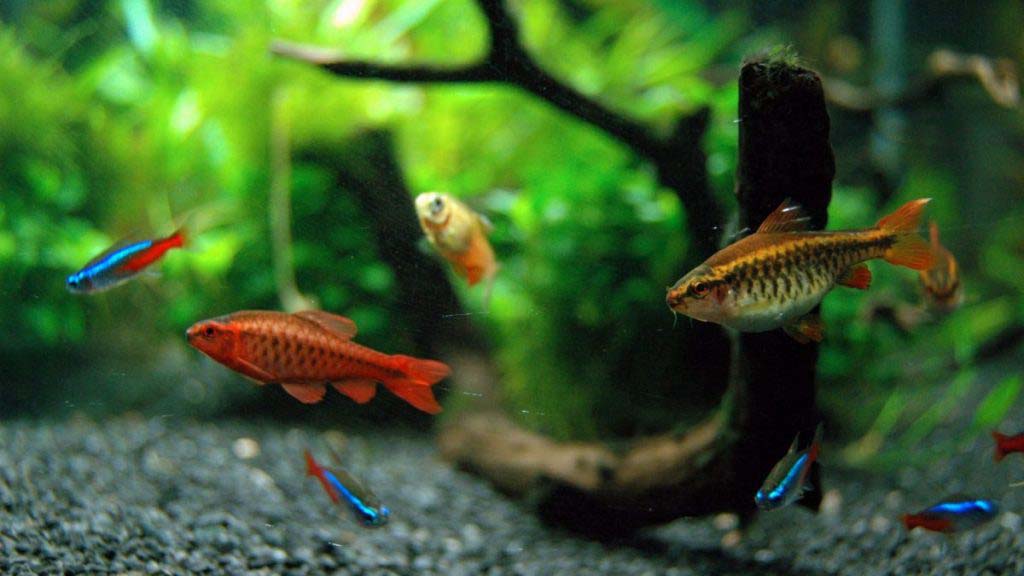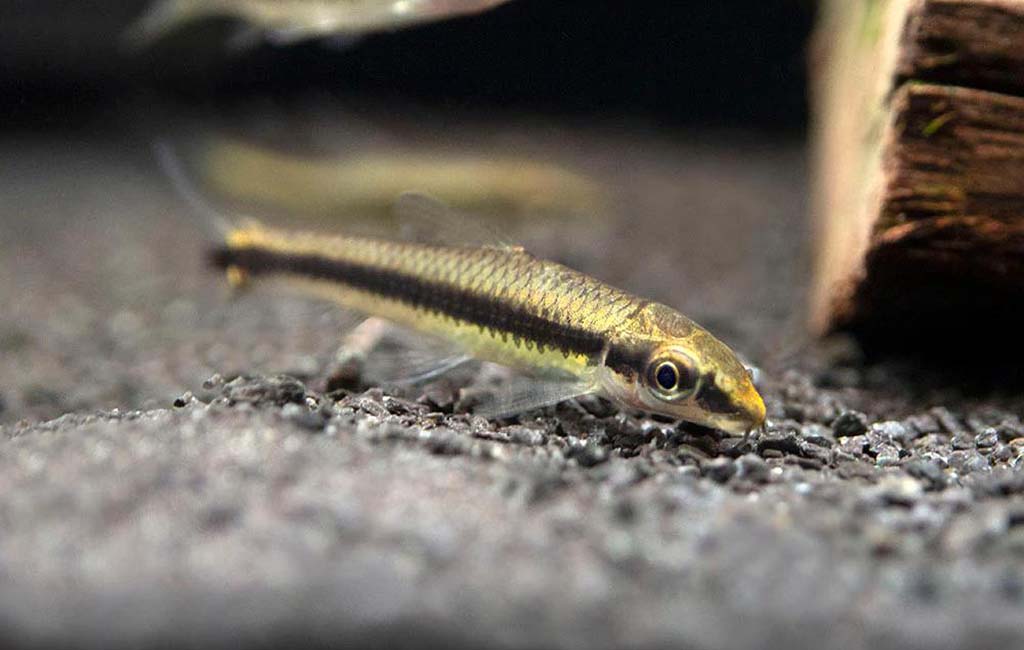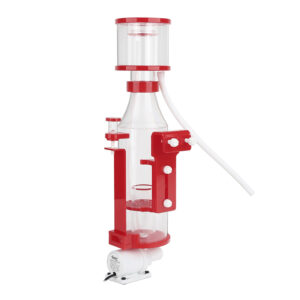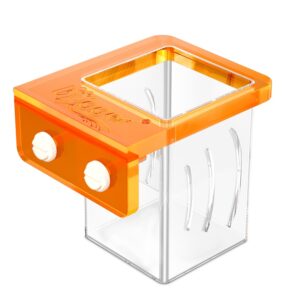Sick and tired of watching your aquarium fish swim in circles or, even worse, not eating at all? Sometimes, you might be feeding them the wrong food. To make things clear, selecting the right aquarium fish food is more than just a matter of convenience, and knowing if a fish is hungry is rather a necessity.
Content Table
This post will discuss various aquarium fish food types, contents of nutrients, and how to select fish foods for your specific fish species. We will also briefly cover what not to feed your aquatic pets and how to tell if they are hungry or not.
Aquarium Fish Food Types
Choosing the right aquarium fish food for your fish is crucial for their health and well-being. Here are the main types of fish food, along with their nutritional benefits.
Flake Food
| Appearance | Nutritional content | Benefits |
| Thin, flat pieces that float on the water’s surface | Typically includes proteins, carbohydrates, vitamins, and minerals | Easy to feed, suitable for most fish species, and often contains a balanced mix of nutrients |
Pellet Food
| Appearance | Nutritional content | Benefits |
| Small, cylindrical pieces that can either float or sink | Similar to flake food, but often comes in specialized varieties for different fish species (e.g., carnivorous, herbivorous) | Ideal for larger fish or those that prefer to eat from the bottom of the aquarium |
Frozen Food
| Appearance | Nutritional content | Benefits |
| Small cubes or flakes of frozen food, such as bloodworms, brine shrimp, or daphnia | Rich in protein, fatty acids, and essential vitamins | High in protein and natural nutrients, providing a varied diet |
Live Food
| Appearance | Nutritional content | Benefits |
| Live organisms like worms, brine shrimp, or mosquito larvae | High in protein and essential fatty acids | Offers a natural, nutritious diet, especially for carnivorous fish |
Freeze-Dried Food
| Appearance | Nutritional content | Benefits |
| Dried, dehydrated organisms like bloodworms or brine shrimp | Similar to frozen food but with reduced moisture content | Convenient and long-lasting, providing a natural food source |
Wafers
| Appearance | Nutritional content | Benefits |
| Thin, flat wafers that sink to the bottom of the aquarium | Often contains a blend of proteins, carbohydrates, and fiber | Ideal for bottom-dwelling fish, such as catfish or loaches |
How to Choose the Right Food For Your Fish
Choosing the right food for your fish is crucial for their health and well-being. Different types of fish have specific dietary needs, so it’s important to select food that is tailored to their species.
Factors to Consider:
- Fish Species: The most important factor is the type of fish you have. Some fish are carnivores, while others are herbivores or omnivores.
- Age and Life Stage: Fish have different nutritional requirements at different stages of their life. Fry and juveniles need a higher protein content, while adults may require more fiber.
- Water Quality: The quality of your aquarium water can also influence your fish’s nutritional needs. For example, fish in a low-nutrient aquarium may require a more nutrient-dense food.
Examples of Freshwater Fish and Marine Fish:
Freshwater Fish
| Carnivores | Herbivores | Omnivores |
| Guppies, swordtails, angelfish, cichlids, goldfish (some varieties) | Plecostomus, algae eaters, mollies (some varieties) | Bettas, tetras, barbs, most catfish |
Marine Fish
| Carnivores | Herbivores | Omnivores |
| Clownfish, tangs, lionfish, eels, sharks | Tangs, rabbitfish, parrotfish, seahorses | Gobies, wrasses, butterflyfish |
Food Types:
- Flake Food: A common choice for most fish, available in various sizes and formulas.
- Pellet Food: Sinking pellets are suitable for bottom-dwelling fish, while floating pellets are ideal for surface feeders.
- Frozen Food: Includes bloodworms, brine shrimp, daphnia, and other live or frozen invertebrates.
- Live Food: This can be beneficial for some fish, but it’s important to ensure the live food is free of parasites.
Tips for Choosing the Right Fish Food:
- Read Labels: Look for food specifically designed for your fish species and life stage.
- Consider Water Quality: If your water is nutrient-poor, opt for food with higher nutrient content.
- Variety is Key: Offer a variety of foods to ensure your fish receive a balanced diet.
- Avoid Overfeeding: Overfeeding can lead to water pollution and health problems.
- Consult a Professional: If you’re unsure about which food to choose, consult with an aquarium expert.

Fish food for aquarium fish
What Not to Feed Aquarium Fish
- Human Food: Many foods that humans eat are toxic to marine fish, and fish will experience gastrointestinal issues when fed them.
- Bread and Rice: These can become lodged in the stomach of the fish and cause pain and discomfort, or even death.
- Tap Water: It is most effective to use tap water, as it may pose health risks to fish due to the chemicals found in it. Always use dechlorinated water.
- Overripe Fruits: Melons and fruits that are overripe can even release toxic gases within the body.
- Frozen Vegetables: These can be hard for the fish to break down, and they may be laced with pesticides.
- Uncooked Meat: Raw meat is dangerous for the aquarium because it can contain bacteria and parasites that can harm the fish.
- Expired Food: Any food that stays for long may not only be unwholesome anymore but may also be subjected to bacterial growth.
- Too Much Food: Some of the consequences of overfeeding are that it causes the pollution of water bodies, as well as some fish diseases.
How to Know if a Fish is Hungry
- Frequent Feeding: When the fish are moving around the bottom of the tank or come near the surface or when they are following the spoon or any object moving on the surface of the water, it is a clear indication that they are hungry.
- Aggression: Stressed-out fish may attempt to attack other fishes or even you, the owner of the aquarium.
- Weight Loss: Lack of appetite, which results in skinny fish is an obvious sign that the fish need food.
- Decreased Activity: Captive fish lack some of these instincts and thus may lose appetite, become less active, and even become lethargic.

How to know if fish is hungry
How to Judge That the Fish Food Matches the Fish in the Tank
Species: Make certain the foods you feed your fish are appropriate for the kind of fish that you have. Certain kinds of fish are then categorized as carnivorous fish, herbivorous fish, or omnivorous fish.
Size: Select the portion size of food that is suitable for that fish, especially if you are feeding large fish. The size of the fish may, for example, determine whether it requires small pellets or flakes.
Life Stage: Think about the kind of fish you have and its age or life stage. The fry and juveniles need higher protein than the adult fish, and the latter may need more fiber.
Water Quality: If your water is low in nutrients, you may have to pick food that is higher in nutrients.
Observation: It depends on the fish species, but generally, you should observe your fish as they feed. If they appear to choke on it or spit it out, then it is most likely that it is not the right size or type.
Variety: Feed your fish several types of food to make sure that they are properly fed at all times.
How Long Can Aquarium Fish Go Without Food?
Most aquarium fish can easily go a few days without food, sometimes up to 48 hours. However, this depends on several conditions, for instance, the type of fish, the size of the fish, and the water quality. Big fish are capable of surviving longer instances without food as compared to small fish.
Concluding Thoughts
Feeding your aquarium fish is vital for the health of your fish and for them to live up to their expected quality. So, knowing what kind of fish food there is, what it is composed of, and how to choose the proper food for your fish, you will be able to properly care for your aquatic companion. It is important not to offer your fish the wrong foods, like people’s foods or spoiled fruits; fix its eyes on its feeding habits to ensure that it has fed enough. If you pay a little more attention, you will be able to create a favorable environment for your fish in the aquarium.


Leave a comment